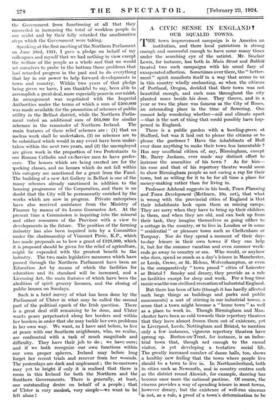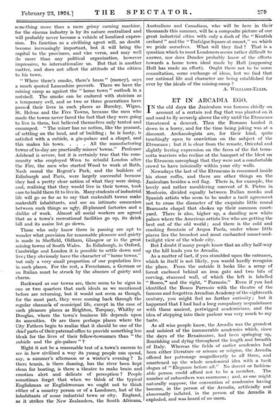A CIVIC SENSE IN ENGLAND ?
OUR SQUALID TOWNS. THE town improvement campaign is in America an institution, and there local patriotism is strong enough and successful enough to have come many times under the searching eye of the satirist. Mr. Sinclair Lewis, for instance, has both in Main Street and Babbitt treated two such campaigns with his usual fury of exasperated affection. Sometimes over there, the " better- ment" spirit manifests itself in a way that seems to us in this country wholly enchanting, as when the citizens of Portland, Oregon, decided that their town was not beautiful enough, and each man throughout the city planted roses beside his door. They throve, and in a year or two the place was famous as the City of Roses, an astounding place in the time of flowering. One cannot help wondering whether—soil and climate apart that is the sort of thing that could possibly have hap- pened in England.
There is a public garden with a bowling-green at Stafford, but was it laid out to please the citizens or to please the gardener ? Have the inhabitants of Hull ever done anything to make their town less lamentable ? Has any unofficial citizen of, say, Birmingham, except Mr. Barry Jackson, ever made any distinct effort to increase the amenities of his town ? As for him— his case and that of his repertory theatre would seem to show Birmingham people as not caring a rap for their town, but as willing for it to be for all time a place for money-making rather than for living in.
Professor Adshead suggests in his book, Town Planning and Town Development (Methuen, /Os. net), that what is wrong with the provincial cities of England is that their inhabitants look upon them as mining camps. They are sorry when they have to bring up their children in them, and when they are old, and can look up from their task, they imagine themselves as going either to a cottage in the country, or to live in London or in some " residential " or pleasure town such as Cheltenham or Torquay. Nor do they spend a moment of their day- to-day leisure in their own towns if they can help it, but for the summer vacation and even summer week- ends go away to country or sea. Who would, or anyhow who does, spend so much as a day's leisure in Manchester, or Leeds, Crewe, or St. Helens, Wolverhampton, or even in the comparatively " town proud " cities of Leicester or Bristol ? Smoky and dreary, they provide as a rule no facilities except for sleep and work. For a long time music wasthe one civilised recreation of industrial England.
But there has been of late (though it has hardly affected such large things as buildings and parks and public monuments) a sort of stirring in our industrial towns, a sense that a town might become a " home town" as well as a place to work in. Though Birmingham and Man- chester have been so cold towards their repertory theatres that they have almost frozen them out of existence, yet in Liverpool, Leeds, Nottingham and Bristol, to mention only a few instances, vigorous repertory theatres have sprung up. Burton-on-Trent, for instance, is an indus- trial town that, though sad enough to the casual visitor, is yet developing a tentative social life. The greatly increased number .of dance halls, too, shows a healthy new feeling that the town where people live should be a town to live in. In Northumberland, both in cities such as Newcastle, and in country centres such as the district round Alnwick, for example, dancing has become once more the national pastime. Of course, the cinema provides a way of spending leisure in most towns, however dreary, but the existence of well-run cinemas -is not, as a rule, a proof of a town's determination to be something more than a mere grimy earning machine, for the cinema industry is by • its nature centralized and will probably never become a vehicle of localized expres- sion. Its function as a civilizing agent will, no doubt become increasingly important, but it will bring the capital to the provinces, and- vice versa; and may well do more than any political organization, however impressive, to internationalize us. But that is another matter, and does not affect the attitude of the citizen to his town.
" Where there's smoke, there's brass " (money), says a much quoted Lancashire proverb. There we have the mining camp as against the " home town " outlook in a nutshell. The smoke can be endured with stoicism as a temporary evil, and so two or three generations have passed their lives in such places as Burnley, Wigan, St. Helens and the Five Towns; because the men who made the towns never faced the fact that they were going to live in them, but believed themselves only tented and encamped. " The miner-has no notion, like the peasant, of settling on the land, and of building ; he is' hasty, is satisfied with a cubicle, a gin-palace and a chapel, and this makes his town. . . . All the manufacturing towns' of to-day are practically miners' towns." Professor Adshead is severe; but it is certainly true that the com- munity- who employed' Wren to rebuild London after the Fire; the men who-' started Wood to work at Bath, Nash round the Regent's Park, and the builders of Edinburgh and Paris, were largely successful because they had a pretty clear notion of what they were - doing, and, realizing that they would live in their towns, took care to build them fit to live in. Many students of industrial life will go so far as to say that makeshift towns make makeshift inhabitants, and see an intimate connexion between such things as ugly, ilPplanned factories and a dislike of work. Almost all social workers are agreed that- as' a town's- recreational facilities go up, its drink bill and its assize list go -down.
Those who only know them in passing are apt to wonder what provision for reasonable pleasure and gaiety is made in Sheffield,. Oldham, Glasgow or in the great mining towns of South Wales. In Edinburgh, in Oxford, Cambridge and London it' is possible to settle down and live; they obviously have the character of "home towns," but only a very small proportion of- our population live in such places. For the rest, a Frenchman, a German or an Italian must be struck by the absence of gaiety and charm.
Backward as our towns are, there seem to be signs in one or two quarters that such ideals as we mentioned before are returning, but it would not seem as though, for the most part, - they. were coming back through the regular channels of municipal life, except in the case of such pleasure places as Brighton, Torquay, Whitby or Douglas, where the town's business life depends upon its amenities. Or are there perhaps places where the City Fathers begin to realize that it should be one of the chief parts of their paternal office to provide something less bleak for the lives of their fellow-townsmen than " the cubicle and the gin-palace " ?
Might it not be a reasonable test of a town's success to see in how civilized a way its young people can spend, say, a• summer's afternoon or a winter's evening ? Is there tennis, is there dancing, has the river been kept clean for boating, is there a theatre to make brain and emotion alert and, delicate of perception ? People sometimes forget that when we think of the typical Englishman or Englishwoman we ought not to think either of a country person or of a Londoner, but of the inhabitants of some industrial town or city. England, as it strikes the New Zealanders, the South Africans, Australians and Canadians, who will be here in their thousands this summer, will be a composite picture of our great industrial cities with only a dash of the " Kentish orchard " and the " Trafalgar Square at sunset," on which we pride ourselves. What will they find ? That is a question which to most Londoners seems rather difficult to answer, nor does Dundee probably know of the efforts towards a home town ideal made by Hull (supposing Hull has made an effort). Ought there not to be some consultation, some exchange of ideas, lest we find that our national life and character are being established for ever by the ideals of the mining-camp ?
A. WILLIAMS-ELLIS.











































 Previous page
Previous page